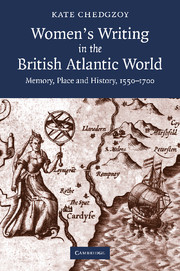Book contents
- Frontmatter
- Contents
- Acknowledgements
- Introduction: ‘A place on the map is also a place in history’
- Chapter 1 ‘The rich Store-house of her memory’: The metaphors and practices of memory work
- Chapter 2 ‘Writing things down has made you forget’: Memory, orality and cultural production
- Chapter 3 Recollecting women from early modern Ireland, Scotland and Wales
- Chapter 4 ‘Shedding teares for England's loss’: Women's writing and the memory of war
- Chapter 5 Atlantic removes, memory's travels
- Conclusion
- Notes
- Bibliography
- Index
Chapter 4 - ‘Shedding teares for England's loss’: Women's writing and the memory of war
Published online by Cambridge University Press: 22 September 2009
- Frontmatter
- Contents
- Acknowledgements
- Introduction: ‘A place on the map is also a place in history’
- Chapter 1 ‘The rich Store-house of her memory’: The metaphors and practices of memory work
- Chapter 2 ‘Writing things down has made you forget’: Memory, orality and cultural production
- Chapter 3 Recollecting women from early modern Ireland, Scotland and Wales
- Chapter 4 ‘Shedding teares for England's loss’: Women's writing and the memory of war
- Chapter 5 Atlantic removes, memory's travels
- Conclusion
- Notes
- Bibliography
- Index
Summary
This chapter examines the politics of location and the textual elaboration of sites of memory in the writings of Anne Bradstreet, Elizabeth Brackley and Jane Cavendish, Hester Pulter and Lucy Hutchinson during the civil war period. It examines the ways in which these women both engaged with the memory of war, and strove to ensure that the conflicts they lived through would be recollected by their societies in particular ways. Combining historiographical, memorial and political aspirations, the poems and life-writings discussed here are all concerned with the relations between civil strife and local and national formations of identity. The national and personal dimensions of the experience of war are anticipated and recollected in texts which inscribe powerful fantasies of England and Englishness onto highly localized sites of memory. Foregrounded at a moment of national crisis, England takes up its place in this book not as the geographical core in relation to which the Celtic countries and the British Americas are peripheral, but as a vulnerable and contested site of politicized memory and identification.
Anticipating the likely course of war in the light of history, or recollecting and meditating on the personal and political meanings of conflict, the writers discussed in this chapter offer multiple accounts of women's involvement in and perceptions of the civil wars.
- Type
- Chapter
- Information
- Women's Writing in the British Atlantic WorldMemory, Place and History, 1550–1700, pp. 125 - 167Publisher: Cambridge University PressPrint publication year: 2007



